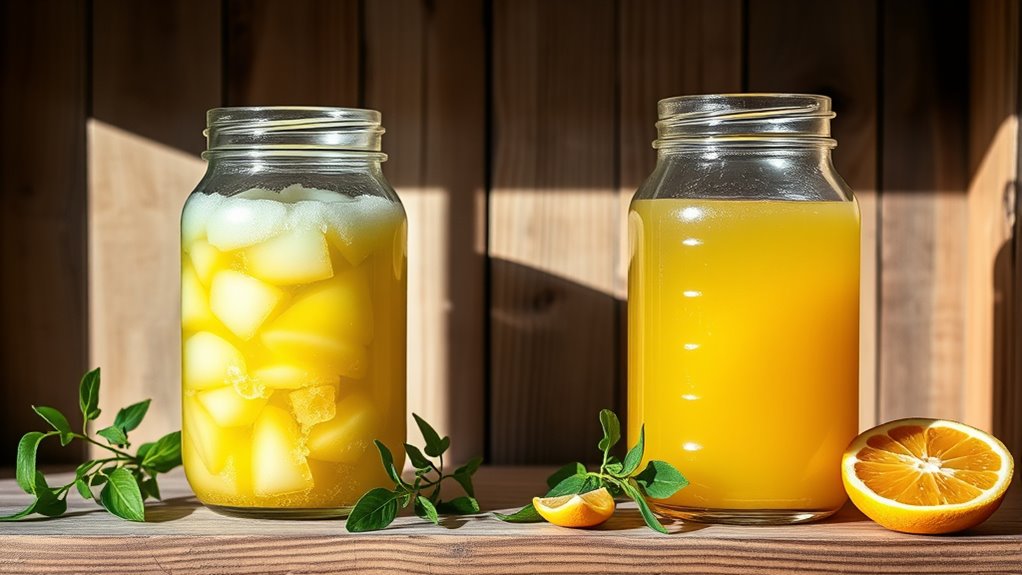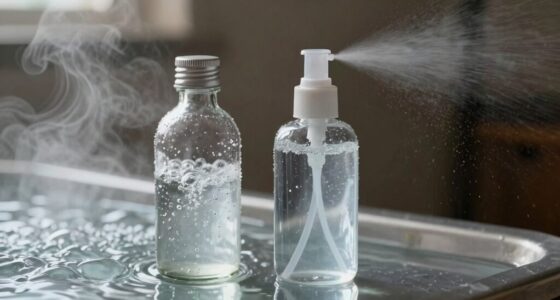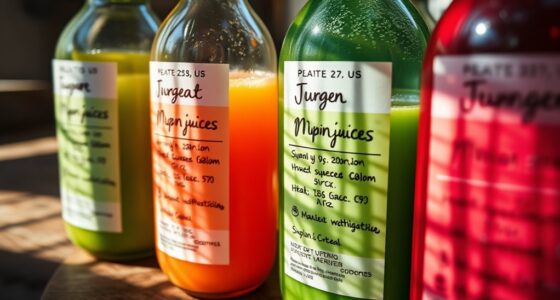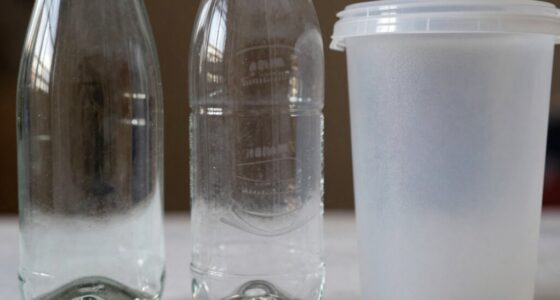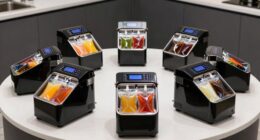Cold-pressed juices typically last about 3 to 5 days in the fridge because they lack heat treatment, which makes them more prone to spoilage. Pasteurized juices can last 1 to 2 weeks if kept properly refrigerated, thanks to the heat process that kills bacteria. To maximize shelf life, guarantee they’re stored in airtight bottles at below 40°F and check for signs of spoilage before consuming. Continue exploring to learn tips on extending their freshness.
Key Takeaways
- Cold-pressed juices last 3-5 days refrigerated; pasteurized juices last 1-2 weeks unopened.
- Pasteurization extends shelf life by eliminating bacteria, unlike cold-pressed juices which are more perishable.
- Both types require refrigeration below 40°F and airtight containers to prevent spoilage.
- Signs of spoilage include sour smell, cloudiness, or fizzy appearance; always inspect before drinking.
- Proper storage and prompt consumption maximize freshness, nutrients, and safety for both juice types.
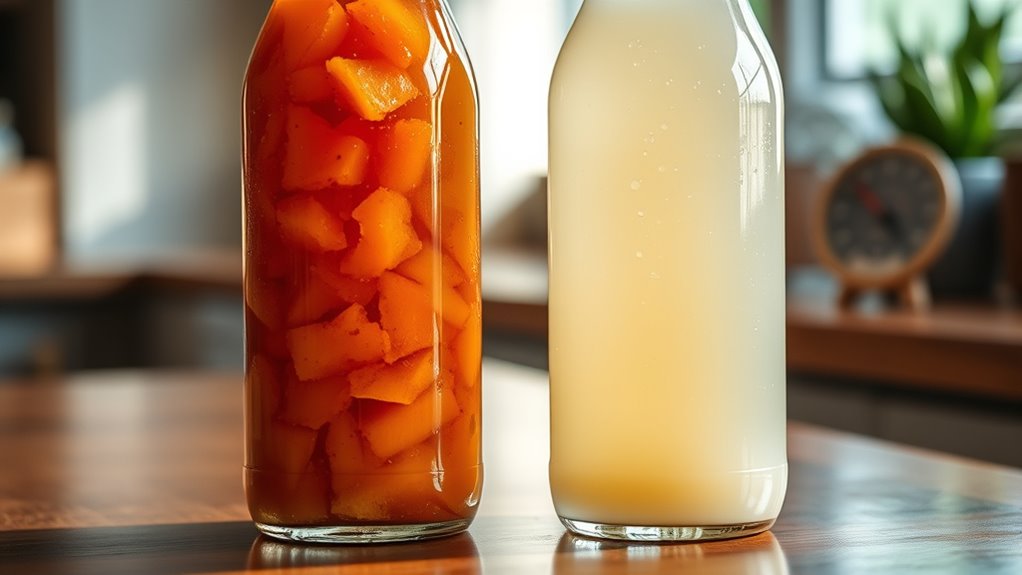
Ever wondered how long your food, medicines, or other perishable items stay safe to use? Knowing the shelf life of different products is essential to guarantee you consume them while they’re still good. When it comes to juices, understanding their shelf life is key to spoilage prevention and maintaining quality. Cold-pressed and pasteurized juices have different storage techniques, which directly impact how long they last and how fresh they stay.
Cold-pressed juices are made by crushing fruits and vegetables with hydraulic press machines, preserving much of the original nutrients and enzymes. However, because they aren’t heat-treated, they’re more vulnerable to spoilage. To extend their shelf life, you need to adopt proper storage techniques. Keep cold-pressed juice refrigerated at temperatures below 40°F (4°C), ideally in airtight containers to prevent exposure to oxygen, which accelerates spoilage. Always check for signs of fermentation, such as sour smells or bubbling, before drinking. Consuming cold-pressed juice within 3 to 5 days is recommended to enjoy maximum freshness and nutrient content. Proper storage not only prolongs the juice’s usability but also prevents bacterial growth, which can cause foodborne illnesses. Since cold-pressed juice is more susceptible to spoilage, it’s especially important to follow these storage guidelines carefully.
Pasteurized juices, on the other hand, undergo heat treatment to kill harmful bacteria and pathogens, which markedly increases their shelf life. These juices are more forgiving in terms of storage, but you still need to follow proper techniques to prevent spoilage. Keep pasteurized juice refrigerated and tightly sealed to avoid contamination and maintain quality. Typically, pasteurized juices can last 1 to 2 weeks in the fridge, depending on the packaging and whether they’ve been opened. Always check the expiration date printed on the bottle and inspect the juice for any changes in color, smell, or texture before consuming. Spoiled juice may develop a sour odor, cloudiness, or fizzy appearance, signaling that it’s no longer safe to drink.
Both types of juice require diligent storage practices, but the main goal remains the same: spoilage prevention. Proper storage techniques extend shelf life, safeguard your health, and help you enjoy the flavors and nutrients for as long as possible. Remember, the moment you open a juice container, its exposure to air begins its countdown, so consume it promptly. Whether you prefer cold-pressed or pasteurized, understanding their differences and storing them correctly ensures you get the most out of your juice without risking spoilage or food waste. Additionally, keeping an eye on signs of spoilage like off-smell or discoloration can help prevent health risks.
Frequently Asked Questions
How Do Storage Conditions Affect Juice Shelf Life?
Storage conditions directly impact your juice’s shelf life by slowing down or accelerating spoilage. Keep it airtight to limit oxygen exposure, which can trigger fermentation and spoilage. Also, store your juice in a cool, dark place to maintain freshness and inhibit microbial growth. Proper storage minimizes fermentation and preserves quality, ensuring you enjoy your juice longer without risking spoilage or flavor loss.
Can Shelf Life Vary Between Different Fruit Types?
Like a rainbow of flavors, shelf life definitely varies between fruit types. You’ll notice riper fruits often produce juice that’s less clear and spoils faster, while firmer, less ripe fruits tend to last longer. Fruit ripeness impacts enzyme activity and microbial growth, affecting juice clarity and shelf life. So, you should expect different fruits to have unique storage times, depending on their ripeness and inherent qualities.
What Are Signs of Spoiled Cold-Pressed Juice?
You’ll notice spoiled cold-pressed juice through fermentation indicators like a fizzy or sour smell, and you might see color deterioration, such as darkening or cloudiness. If the juice develops an off-putting taste or becomes slimy, these are signs it’s gone bad. Trust your senses—if it smells odd, tastes strange, or looks different from when you bought it, it’s best to discard it to avoid health risks.
Does Packaging Impact Juice Freshness Over Time?
Yes, packaging impacts juice freshness over time. You should look for packaging materials that are opaque or UV-protected, as they shield the juice from light exposure, which can degrade nutrients and flavor. Airtight containers help prevent oxidation and spoilage. Keep your juice stored in a cool, dark place, and avoid transparent bottles in direct sunlight. Proper packaging and storage extend the freshness and quality of your juice.
Are There Preservatives That Extend Juice Shelf Life?
Yes, natural preservatives like lemon juice or ascorbic acid can help extend your juice’s shelf life. Pasteurization methods, such as high-pressure processing or traditional heat pasteurization, also notably slow down spoilage. These techniques reduce harmful bacteria while maintaining flavor and nutrients. By choosing juices with natural preservatives or pasteurization, you can enjoy fresher-tasting juice longer and ensure it stays safe for consumption over time.
Conclusion
Knowing the difference between cold-pressed and pasteurized juices helps you make the best choice for your health. Cold-pressed juices are like a fresh burst of sunshine, packed with nutrients but shorter-lived. Pasteurized juices are the steady lighthouse, offering a longer shelf life but with fewer nutrients. Choose what suits your lifestyle, but remember, your health is the treasure at the end of the journey. Make your decision wisely and savor every sip.
Cindy thoroughly researches juicing trends, techniques, and recipes to provide readers with practical advice and inspiration. Her writing style is accessible, engaging, and designed to make complex concepts easy to understand. Cindy’s dedication to promoting the advantages of juicing shines through her work, empowering readers to make positive changes in their lives through the simple act of juicing.

